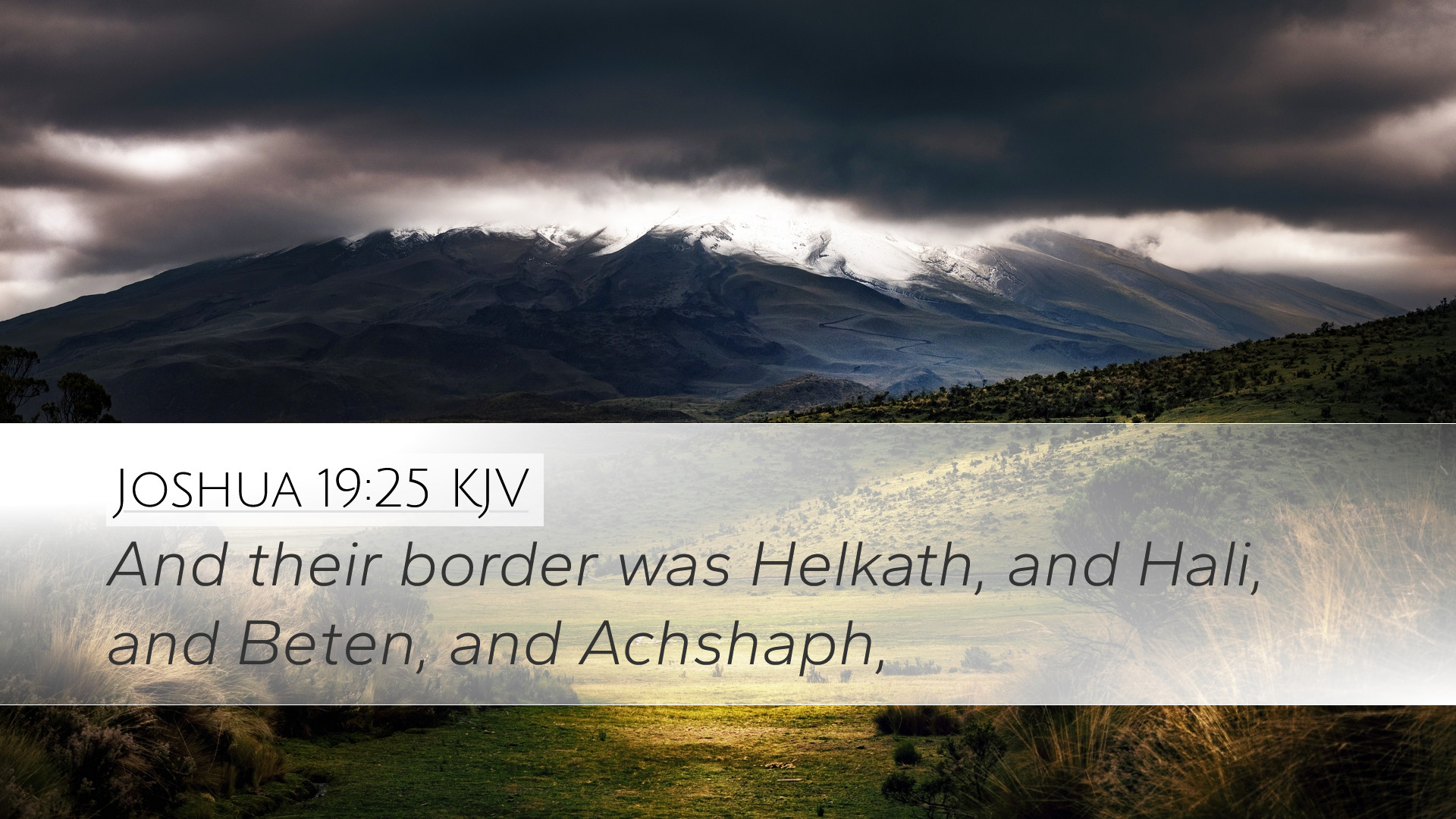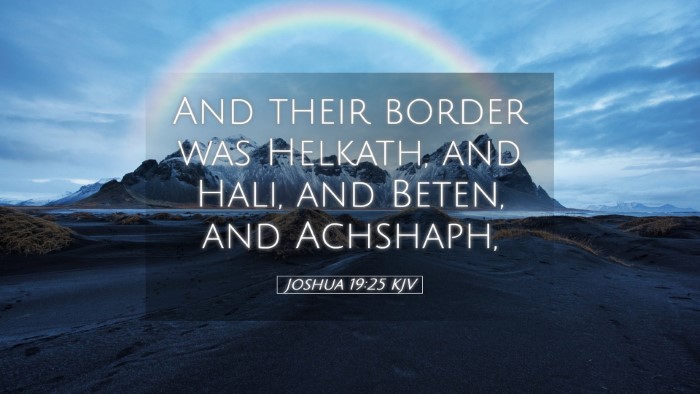Commentary on Joshua 19:25
Verse Context: Joshua 19:25 states, "And the land of the tribe of the children of Simeon was included within the inheritance of the children of Judah." This verse highlights the distribution of land among the tribes of Israel as they settle in Canaan. The significance of this passage ties into the overall theme of divine allocation and fulfillment of God's promises to His people.
General Overview
This verse serves a critical function in outlining the inheritance of the land as allotted to the tribes of Israel. Specifically, it addresses the inheritance of the tribe of Simeon and its relationship to the larger territory of Judah. Understanding this allocation provides insight into Israel's tribal dynamics and the prophetic and historical narratives of the Old Testament.
Insights from Public Domain Commentaries
Matthew Henry's Commentary
Matthew Henry interprets Joshua 19:25 as reflecting the sovereignty of God in the distribution of land among the tribes. He notes that Simeon, being a smaller tribe, receives land within the bounds of Judah, which signifies both a fulfillment of God's promise and the ongoing theme of grace. Henry writes:
"The tribe of Simeon had a small inheritance among the larger tribe of Judah, which shows God's providence in providing for the needs of His people amidst their limitations."
Henry emphasizes that this allocation demonstrates God's careful and purposeful design. The interconnectedness of the tribes, particularly the placement of Simeon within Judah, suggests an underlying strategy in how the tribes coexisted within the Promised Land.
Albert Barnes' Notes
Albert Barnes offers a critical analysis of the geographical and contextual implications of this verse. He points out that the territory of Simeon was relatively small and surrounded by Judah, which may have influenced their vulnerability and dependence on their larger neighbor. Barnes states:
"This provision shows the subtlety of God's plan; the tribes were to be mutually supportive, signifying that the unity among God's people was essential for their survival and fulfillment of God's mission."
Furthermore, Barnes articulates that such an arrangement exemplifies the broader themes of Israel's identity, the importance of loyalty, and community life within the tribes. The synergy between the larger tribe of Judah and the smaller tribe of Simeon symbolizes God’s grace working through human relationships.
Adam Clarke's Commentary
Adam Clarke delves deeper into the linguistic aspects of the Hebrew text, addressing the implications of Simeon's inheritance. He elucidates that the name 'Simeon' reflects the tribe's turbulent history and their struggle for prominence. Clarke notes:
"The naming of lands and the families associated with them illustrate God’s providence in mapping out history."
Clarke particularly emphasizes the theological implications of land inheritance as symbolic of God's promises to Abraham, Isaac, and Jacob. He views the geographical boundaries not merely as physical constructs but as crucial components of God’s unfolding redemptive plan.
Theological Implications
The distribution of land as described in Joshua 19:25 is laden with theological significance. Firstly, it reinforces the concept of divine sovereignty. God is sovereign over the land and its inhabitants, orchestrating the history and destiny of His chosen people. This speaks to a larger theme of God's involvement in the world, guiding His people according to His will.
Secondly, the intermingling of the tribes signifies the importance of community and collective identity in God's covenant. Israel's strength lay not solely in individual tribes but in their unity and cooperation. This communal aspect reflects the body of Christ in the New Testament, where the church is called to operate in unity and love despite diverse backgrounds and roles.
Conclusion
Joshua 19:25 encapsulates rich themes vital for understanding the identity and mission of Israel as God’s chosen people. The commentaries from Matthew Henry, Albert Barnes, and Adam Clarke converge in their interpretation of Simeon's inheritance as a profound lesson in God’s providence and the necessity of community amidst diversity. For pastors, students, theologians, and scholars, this verse serves as a reminder of God’s sovereignty, the importance of interdependence among believers, and the ultimate purpose of God's redemptive narrative throughout Scripture.


